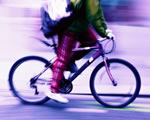 Go to main content
Go to main content
Archive Website of the UK government
Please note that this website has a UK government accesskeys system.
Main menu
Page menu
Travel and transport

Cycling safely

You'll need the right clothing and safety equipment if you're going to cycle regularly on busy roads. You should know the Highway Code and how to ride with confidence. Get advice on the gear you'll need and how to handle busy roads.
Make sure you have the right gear
Fit a bell to your bike so you can signal to other road users
Make sure you wear clothing that’s appropriate for cycling. You should be able to move freely without anything getting caught in your bike's chain or wheels, or covering your lights. You should wear:
- light-coloured or fluorescent clothing that helps other road users to see you in daylight and poor light
- reflective clothing and/or accessories, like a belt or arm/ankle bands, in the dark
Your rucksack can affect your balance on a bike if it's too big or heavy. You could use panniers instead.
Helmets
Helmets can help prevent a head injury if you fall from your bike. You should wear a helmet that:
- meets the British Standard (BS EN 1078:1997)
- is a snug fit and positioned squarely on your head - sitting just above your eyebrows, not tilted back or tipped forwards
- is securely fastened by straps, which aren't twisted, with only enough room for two fingers between your chin and the strap
Make sure you replace your helmet every five years. Don't buy a second-hand helmet - it may be damaged and not protect you properly.
Compulsory lights and reflectors
If you use your bike at night or when visibility is poor, you must fit a:
- white front light
- red rear light
- red rear reflector
- amber/yellow pedal reflectors - front and back on each pedal
Reflectors fitted to the front and the spokes will also help you to be seen.
You can get lights that are steady or flashing or a mixture (steady at the front and flashing at the back). A steady light at the front is important when you're cycling through areas without good street lighting.
Check that any steady lights meet BS 6102-3. Flashing lights don't have to meet the standard but they must:
- flash at a rate of one to four equal flashes per second
- be at least four candelas in brightness
Your pedal reflectors and rear reflector must meet BS 6102-2. You can also use a light or reflector that meets a standard accepted by another European Commission (EC) country (equal to the British Standard).
Additional lights and reflectors
You can use other lights as well as the compulsory ones but they must:
- be the right colour - white at the front, red at the back
- not dazzle other road users
If they flash, it must be at a rate of one to four equal flashes per second.
How to cycle safely on the road
Stay alert!
Don't listen to music or use a mobile phone while cycling – distractions cause accidents
When you're cycling on busy roads you need to show drivers what you plan to do. Motorists usually travel faster than cyclists and may have less time react to hazards.
Try to anticipate what a driver will do and:
- ride positively and decisively
- look and signal before you start, stop or turn
- ride well clear of the kerb - 1 metre away or in the centre of the left lane
- make eye contact with drivers to let them know you have seen them
- acknowledge any courtesy from drivers
- ride a car-door width away from parked cars
To learn how to handle busy roads and ride more confidently, get some cycle training.
Cycling on shared paths
People may not see or hear you approaching on shared paths so:
- slow down
- use your bell to let people know you're there
- be prepared to slow down or stop if necessary
- keep to the cyclists' side
Know your Highway Code
The Highway Code explains the laws you and other road users must follow. It provides advice on safe road use and information on the meaning of the different signs and road markings that you must obey. You should know the rules for cyclists, as well as the rules for all road users, before you cycle on the road.
If you have an accident
Tell the police if you're involved in a collision on your bike where someone is injured. Make sure anyone who is hurt gets medical attention.
You should get insurance for yourself and your bike. If you don't, you may have to pay for any damage caused to someone or their property because of an accident with your bike. You may receive third-party insurance if you become a member of some cycling organisations.
More useful links
Additional links
THINK! road safety advice

Find out how to stay safe on the roads with THINK! facts and stats, adverts and games
Simpler, Clearer, Faster

From 17 October, GOV.UK will be the best place to find government services and information
 Facebook
Facebook Twitter
Twitter StumbleUpon
StumbleUpon Delicious
Delicious Reddit
Reddit